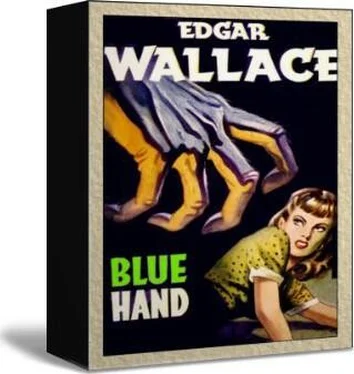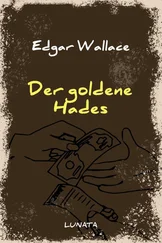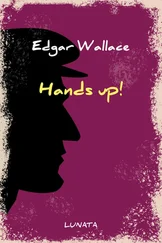Edgar Wallace - Blue Hand
Здесь есть возможность читать онлайн «Edgar Wallace - Blue Hand» весь текст электронной книги совершенно бесплатно (целиком полную версию без сокращений). В некоторых случаях можно слушать аудио, скачать через торрент в формате fb2 и присутствует краткое содержание. Год выпуска: 0101, Жанр: Старинная литература, на английском языке. Описание произведения, (предисловие) а так же отзывы посетителей доступны на портале библиотеки ЛибКат.
- Название:Blue Hand
- Автор:
- Жанр:
- Год:0101
- ISBN:нет данных
- Рейтинг книги:3 / 5. Голосов: 1
-
Избранное:Добавить в избранное
- Отзывы:
-
Ваша оценка:
- 60
- 1
- 2
- 3
- 4
- 5
Blue Hand: краткое содержание, описание и аннотация
Предлагаем к чтению аннотацию, описание, краткое содержание или предисловие (зависит от того, что написал сам автор книги «Blue Hand»). Если вы не нашли необходимую информацию о книге — напишите в комментариях, мы постараемся отыскать её.
Blue Hand — читать онлайн бесплатно полную книгу (весь текст) целиком
Ниже представлен текст книги, разбитый по страницам. Система сохранения места последней прочитанной страницы, позволяет с удобством читать онлайн бесплатно книгу «Blue Hand», без необходимости каждый раз заново искать на чём Вы остановились. Поставьте закладку, и сможете в любой момент перейти на страницу, на которой закончили чтение.
Интервал:
Закладка:
“That is quite unimportant,” said Digby, and leaning forward over the table, he lowered his voice. “Eunice, do you realize what I am offering you and the alternative?”
“I will not marry you,” she answered steadily, “and no threat you make will change my mind.”
His eyes did not leave hers.
“Do you realize that I can make you glad to marry me,” he said, choosing his words deliberately, “and that I will stop at nothing—nothing?”
She made no reply, but he saw her colour change.
“Now understand me, my dear, once and for all. It is absolutely necessary that I should marry you, and you can either agree to a ceremony or you can take the consequence, and you know what that consequence will be.”
She had risen to her feet and was looking down at him, and in her eyes was a contempt which would have wilted any other man than he.
“I am in your power,” she said quietly, “and you must do what you will, but consciously I will never marry you. You were able to drug me yesterday, so that I cannot remember what happened between my leaving your house and my arrival in this wretched place, and possibly you can produce a similar condition, but sooner or later, Digby Groat, you will pay for all the wrong that you have done to the world. If I am amongst the injured people who will be avenged, that is God’s will.”
She turned to leave the room, but he was at the door before her and pulled her arm violently towards him.
“If you scream,” he said, “I will choke the life out of you.”
She looked at him with contempt.
“I shall not scream.”
Nor did she even wince when the bright needle passed under the skin of her forearm.
“If anything happens to me,” she said in a voice scarcely above a whisper, “I will kill myself in your presence, and with some weapon of yours.” Her voice faded away and he watched her.
For the first time, he was afraid. She had touched him on a sensitive point—his own personal safety. She knew. What had put that idea into her head, he wondered, as he watched the colour come and go under the influence of the drug? And she would do it! He sweated at the thought. She might have done it here, and he could never have explained his innocence of her murder.
“Phew!” said Digby Groat, and wiped his forehead.
Presently, he let her hand drop and guided her to a chair.
Again, her hand touched her arm, tenderly, and then:
“Get up,” said Digby, and she obeyed. “Now go to your room and stay there until I tell you I want you.”
CHAPTER THIRTY-SIX
THAT afternoon he had a visitor. He was, apparently, a gentleman who was anxious to rent a garage, and he made one or two inquiries in the mews before he called at Digby Groat’s temporary home. Those people who troubled to observe him, noticed that he stayed a considerable time within this garage, and when he came out he seemed satisfied with his negotiations. He was in truth Villa, who had come in answer to an urgent wire.
“Well,” said Digby, “is everything ready?”
“Everything is ready, dear friend,” said Villa amiably. “I have the three men you want. Bronson is one, Fuentes and Silva are the others; they are known to you?”
Digby nodded. Bronson was an army aviator who had left the service under a cloud. Digby had employed him once before, to carry him to Paris—Bronson ran a passenger carrying service which Digby had financed. The other two he knew as associates of Villa—Villa had queer friends.
“Bronson will be in a field just outside Rugby. I told him to pretend he had made a false landing.”
“Good,” said Digby. “Now you understand that I shall be travelling north in the disguise of an old woman. A car must be waiting a mile short of the station and Fuentes must reach the line with a red hand-lamp and signal the train to stop. When it stops he can clear and by that time I shall be well away. I know Rugby well and this sketch-map will tell you everything.” He handed a sheet of paper to Villa. “The car must be waiting at the end of the lane marked B. on the plan—the house—is it in good condition?”
“There’s a house on the property,” said Villa, “but it is rather a tumbledown affair.”
“It can’t be worse than Kennett Hall,” said Digby. “That will do splendidly. You can keep the girl there all night and bring her to Kennett Hall in the morning. I will be there to receive you. Tomorrow afternoon, just before sundown, we will take our final flight to the sea.”
“What about Bronson?”
“Bronson will have to be settled with,” said Digby, “but you can leave that to me.”
He had his own views about Bronson which it was not expedient at the moment to discuss.
“How are you going to get to the Hall?” asked the interested Villa.
“You can leave that to me also,” said Digby with a frown. “Why are you so curious? I will tell you this much, that I intend taking on the car and travelling through the night.”
“Why not take the girl by the car?” demanded the persistent Villa.
“Because I want her to arrive at Kennett Hall by the only way that is safe. If the Hall is being watched, there is a chance of getting away again before they close in on us. No, I will be there before daybreak, and make a reconnaissance. In a case like this, I can trust nobody but myself, and what is more, Villa, I know the people who are watching me. Now, do you understand?”
“Perfectly, my friend,” said Villa jovially; “as to that little matter of sharing out—”
“The money is here,” said Digby, tapping his waist, “and you will have no cause to complain. There is much to be done yet—we have not seen the worst of our adventures.”
For Eunice Weldon the worst was, for the moment, a splitting headache which made it an agony to lift her head from the pillow. She seemed to have passed through the day in a condition which was neither wakefulness nor sleep. She tried to remember what had happened and where she was, but the effort was so painful that she was content to lie with her throbbing head, glad that she was left alone. Several times the thought of Digby Groat came through her mind, but he was so inexplicably confused with Jim Steele that she could not separate the two personalities.
Where she was she neither knew nor cared. She was lying down and she was quiet—that satisfied her. Once she was conscious of a sharp stinging sensation in her right arm, and soon after she must have gone to sleep again, only to wake with her head racked with shooting pains as though somebody was driving red-hot nails into her brain.
At last it became so unendurable that she groaned, and a voice near her—an anxious voice, she thought—said;
“Have you any pain?”
“My head,” she murmured. “It is dreadful!”
She was conscious of a “tut” of impatience, and almost immediately afterwards somebody’s arm was round her neck and a glass was held to her lips.
“Drink this,” said the voice.
She swallowed a bitter draught and made a grimace of distaste.
“That was nasty,” she said.
“Don’t talk,” said the voice. Digby was seriously alarmed at the condition in which he found her when he had returned from a visit of reconnaissance. Her colour was bad, her breathing difficult and her pulse almost imperceptible. He had feared this, and yet he must continue his “treatment.”
He looked down at her frowningly and felt some satisfaction when he saw the colour creep back to the wax-like face, and felt the throb of the pulse under his fingers.
As to Eunice, the sudden release from pain which came almost immediately after she had taken the draught, was so heavenly that she would have been on her knees in gratitude to the man who had accomplished the miracle, and with relief from pain came sleep.
Читать дальшеИнтервал:
Закладка:
Похожие книги на «Blue Hand»
Представляем Вашему вниманию похожие книги на «Blue Hand» списком для выбора. Мы отобрали схожую по названию и смыслу литературу в надежде предоставить читателям больше вариантов отыскать новые, интересные, ещё непрочитанные произведения.
Обсуждение, отзывы о книге «Blue Hand» и просто собственные мнения читателей. Оставьте ваши комментарии, напишите, что Вы думаете о произведении, его смысле или главных героях. Укажите что конкретно понравилось, а что нет, и почему Вы так считаете.












